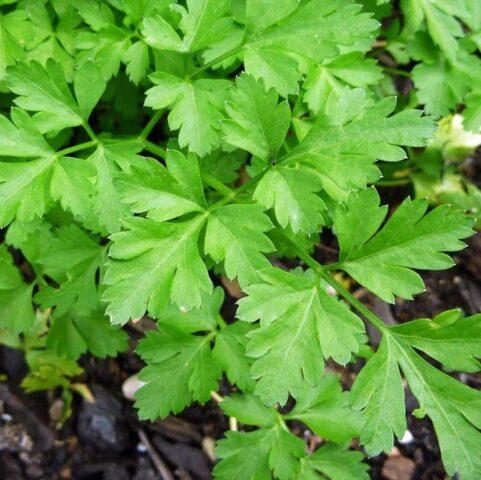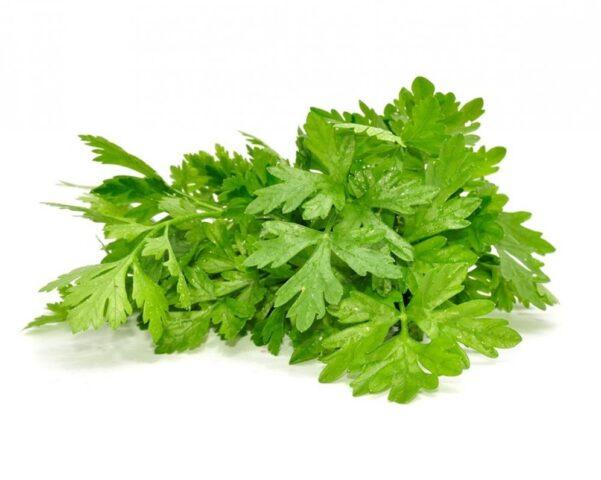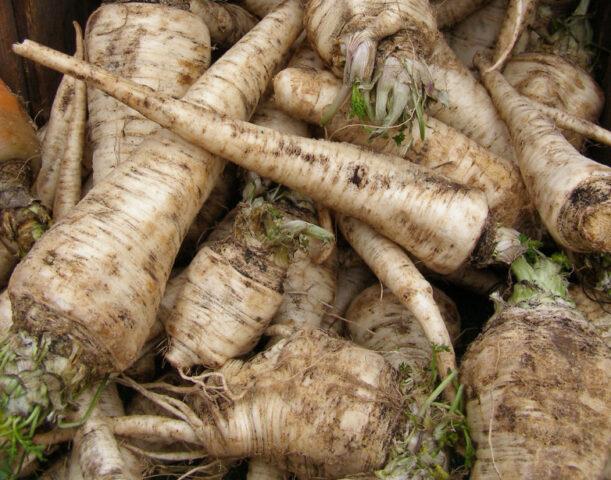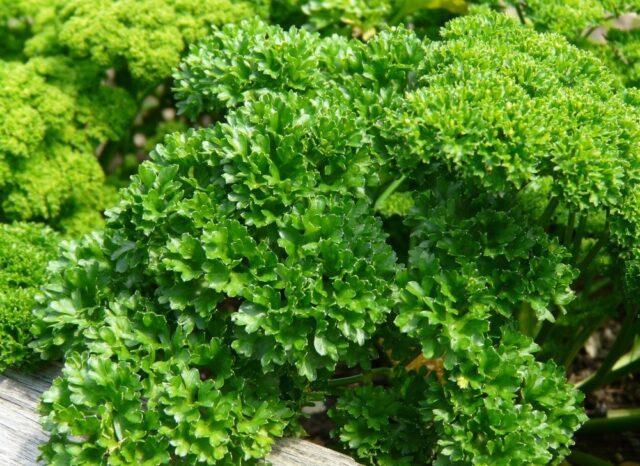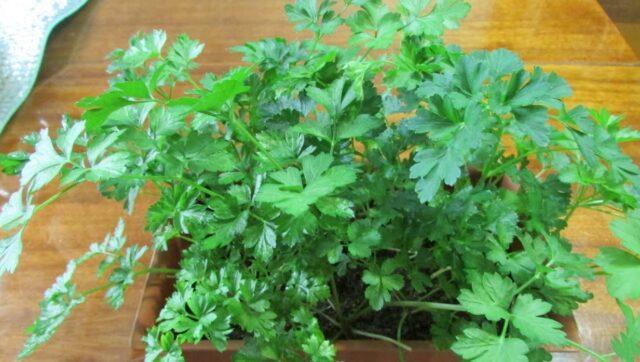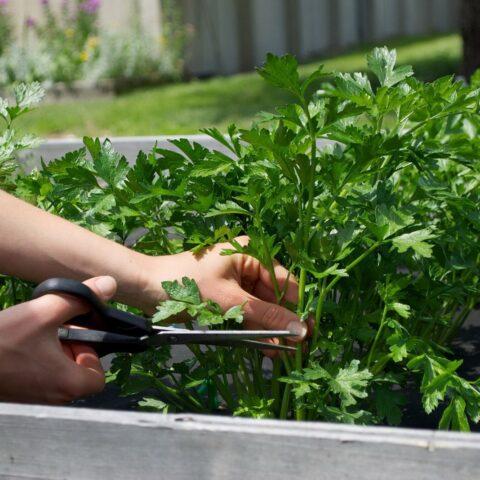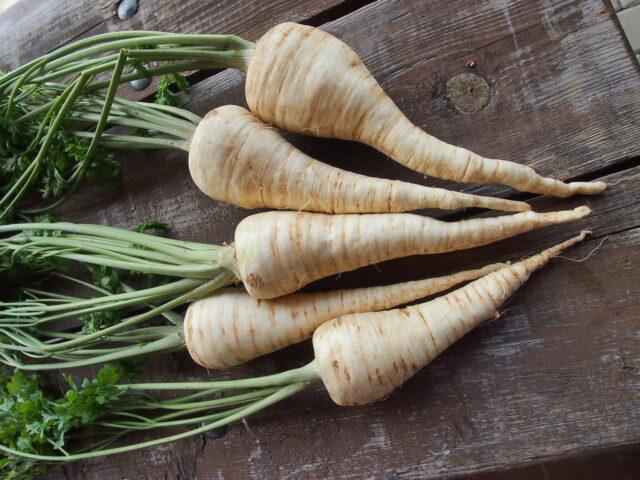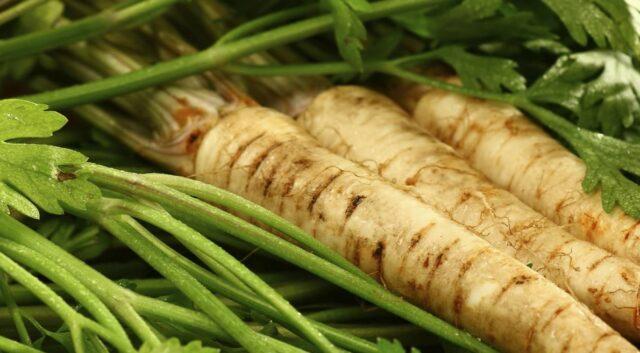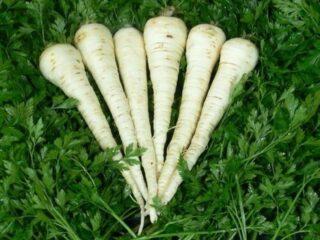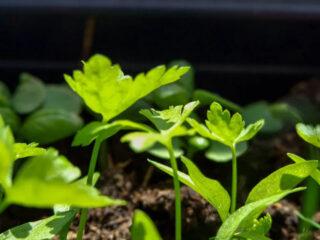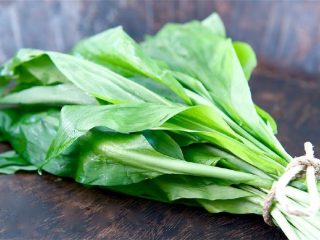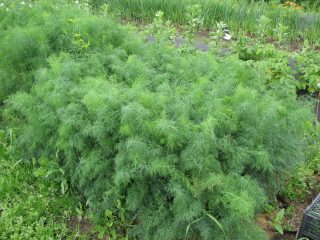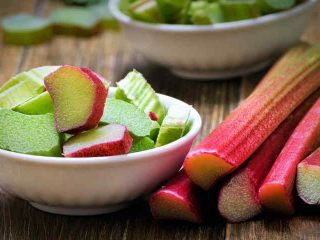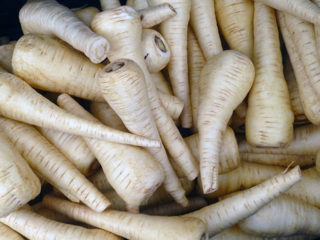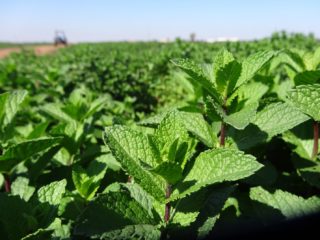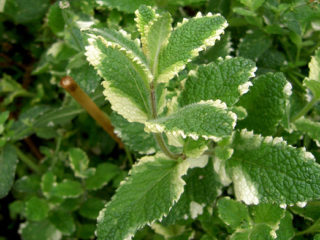Content
Parsley is a spicy crop that is popular all over the world. But they love it not only for its pleasant rich aroma, but also for its great beneficial properties for human health. Therefore, the culture is used in cooking, as well as in medicine and cosmetology. But depending on the variety of parsley, the features of its use may differ. Therefore, when purchasing, you need to pay attention to this, since the plant comes in two types.
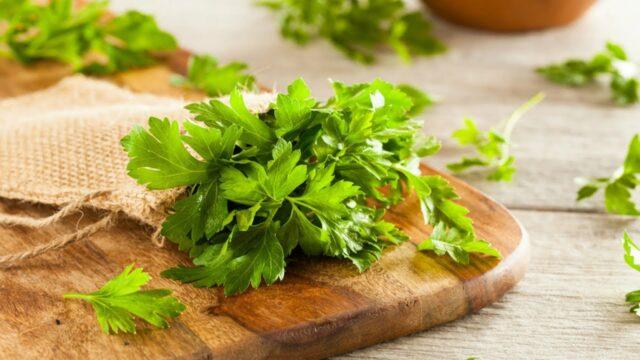
This spicy crop surpasses citrus fruits in vitamin C content
Description of parsley with photo
Parsley belongs to the Umbrella family. Its close relatives are celery, carrots and dill. Parsley is cultivated everywhere in all regions, as it does not require care and is not afraid of frost.
What does parsley look like?
This spicy plant forms bushes 30-100 cm high (depending on the type). The culture has a spindle-shaped thickened fleshy root of a yellowish-white hue.The plant forms one or several upright, furrowed stems that branch extensively.
The lower leaves are ovoid and doubly pinnate. The upper plates on the shoots are trifoliately dissected.
The flowers are small, white, yellow or greenish in color, collected in apical umbellate inflorescences. Buds on the plant form in June or July (depending on the variety).
The seeds are small, elongated, brown in color, and ripen in September. They remain viable for four years.
Is parsley a vegetable?
The leaves and roots of this spicy crop are used for food. And many people still don’t understand that parsley is a vegetable or a herb. And disputes often arise about this in various gardener forums.
Parsley is a leafy vegetable. And when growing it, in order to obtain a high-quality harvest, it is recommended to promptly remove flower stalks on the plant.
Is parsley perennial?
This crop is biennial. In the first year after planting, it forms a root and intensively grows foliage. And in the second season, the plant forms flower stalks and produces seeds. After ripening, they fall to the ground and germinate, so this crop can be considered partly perennial.
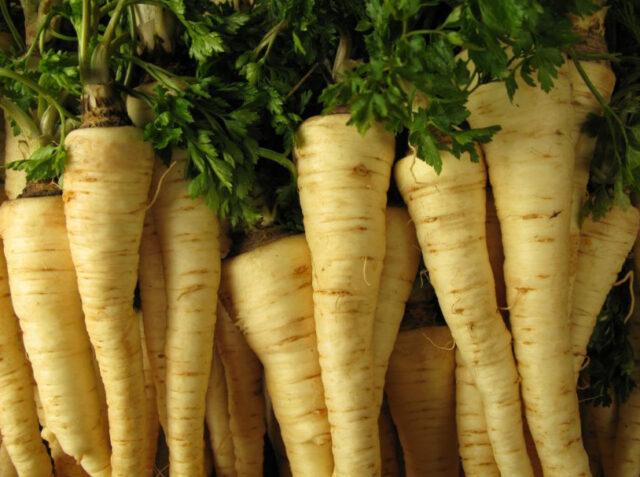
Root varieties are grown not for greens, but to produce bitter fruits
What types of parsley are there?
There are two types of parsley: leaf and root. In the first case, the plant directs its forces to the formation of the above-ground part. The leafy type has thin, branched roots that have no nutritional value. This parsley produces between 20 and 100 leaves. It, in turn, is divided into two more subspecies: ordinary, curly.The leaves of the first have a smooth surface and are serrated, while the leaves of the second have corrugated segments of the plates.
In the root species, the nutritional value is from the underground part of the plant. It is used as an additive to dishes, as well as for medicinal purposes. The root crop of this type of crop is fleshy, large, weighing 100-150 g. The underground part has white flesh.
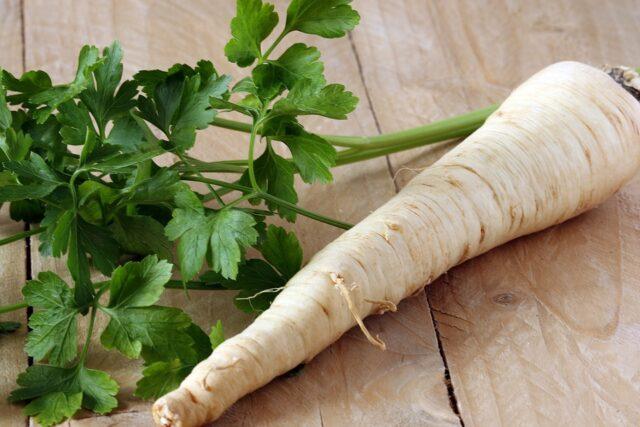
A strongly pronounced spicy aroma is present in the leaf and root species
The best varieties of parsley for greens
Leaf parsley is very popular among gardeners. The harvest of this crop ripens even in regions with risky farming. But among all the variety of varieties of perennial leaf parsley, there are species that stand out significantly from the rest.
Aster
The curly look was achieved thanks to the efforts of Czech breeders. The variety is characterized by a raised leaf rosette. The blades of Aster parsley (Etroselinum crispum Astra) are large, tender, and highly corrugated. The root is hard and not edible. The harvest ripens in 80-90 days, and with winter planting after 5-6 months. This variety is considered universal, ideal for growing in greenhouses and greenhouses. The yield is 5 kg per 1 sq. m.
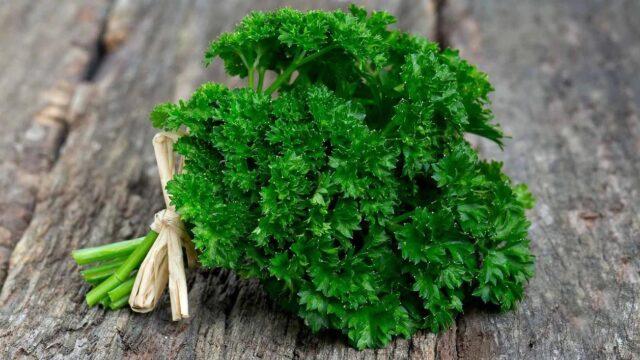
Aster grows green mass very quickly after cutting
Carnival
According to reviews from gardeners, this is one of the best varieties of leaf parsley. Karnaval has an early ripening period. This species is characterized by lush bushes. Carnival's plates are dark green with a smooth surface. The first harvest ripens three months after germination. Forms leaves from 40 to 100 pcs.
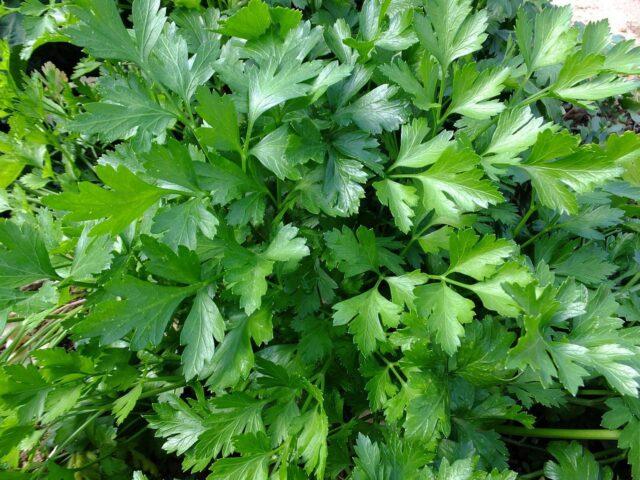
Carnival is highly resistant to fungal diseases
Breeze
An early ripening variety of leafy curly parsley. The leaves of Breeze are strongly corrugated, green, and shiny. The first harvest ripens in 80 days. Four leaf cuttings can be carried out per season. The height of the bushes reaches 75 cm. The yield of the variety is 2.5 kg per 1 sq. m. The species is ideal for preparing marinades and pickles.
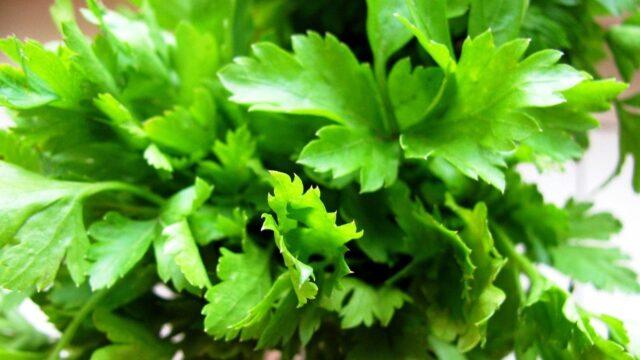
Breeze is valued for its high content of ascorbic acid
Gloria
Leaf type of early ripening. The height of Gloria's bushes reaches 25-40 cm. The first harvest can be cut in 60-65 days. The variety is characterized by dark green tender leaves, the spicy aroma of which is clearly expressed. Productivity – 1.7 kg per 1 sq. m.
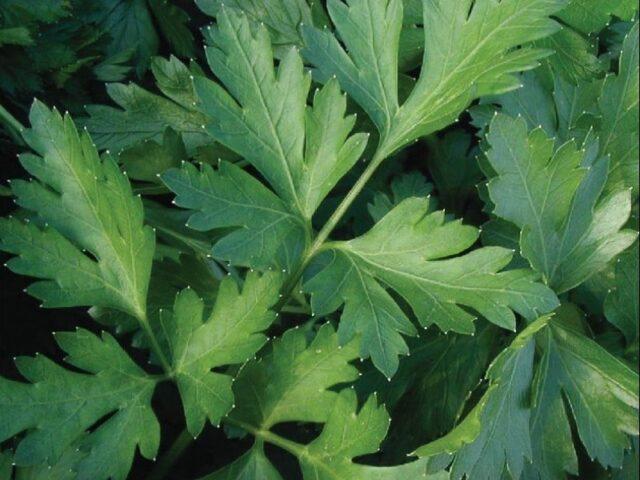
Gloria tolerates long-term fresh storage well
Titanium
A variety of Dutch selection, which is characterized by high productivity. Characterized by early ripening. The first cut of the crop can be carried out 70 days after emergence. The bushes of Titan (Bejo) grow upright, the leaves are dark green, large, with a delicate spicy taste.
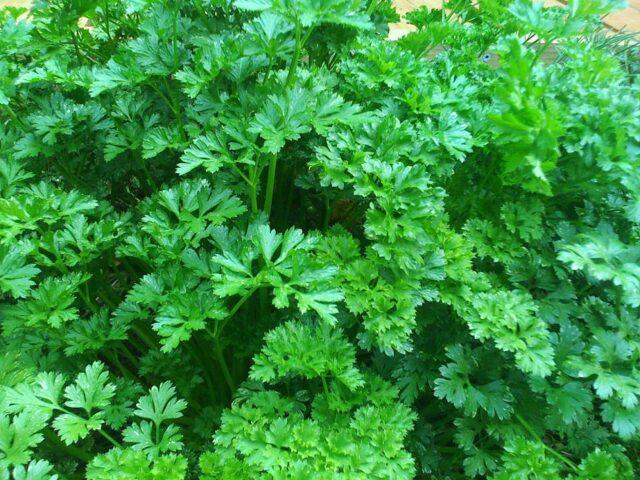
Titanium green retains its hue even after processing
Varieties of root parsley with photos and descriptions
Root parsley is recommended to be grown in fertile, loose soil. Therefore, to get a good harvest, you need to prepare the bed in advance and apply organic fertilizers. But productivity depends not only on soil fertility and care. Therefore, you should pay attention to the most productive root species of parsley, photos with names of which are presented below.
Sugar
An early ripening variety of crop. The leaves are triangular, the flowers are greenish-yellow.The length of the root crop reaches 30 cm, and the diameter is about 4 cm. The yield of the Saharnaya variety is 3.5 kg. Root crops ripen in 3.-3.5 months. Forms strong, lush, spreading bushes.
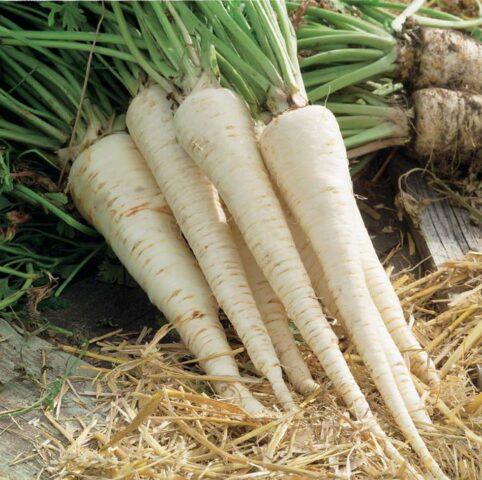
Sugar parsley forms up to 40 shoots in a rosette
Berlin
This root vegetable is ideal for making marinades and pickles, which is why many gardeners prefer it. The harvest ripens within 140-150 days from the moment the seeds germinate. The roots of Berlin parsley have the shape of a regular cone. Their average weight varies between 50-110 g. The root grows in length about 20-30 cm and reaches a diameter of 4-5 cm.
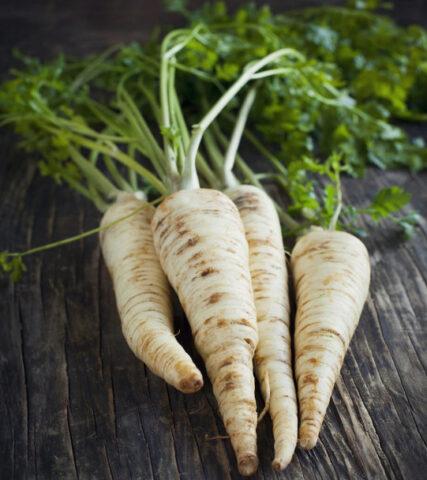
Berlin is resistant to cracking and branching
Berlinia late ripening
A variety of German selection, characterized by juicy root vegetables, the length of which reaches 20 cm. The pulp is white in color, has a pleasant taste and aroma. The growing season of Berlinia is 90-110 days. The variety is suitable for fresh consumption, freezing and drying. The average weight of root vegetables is about 70 g.
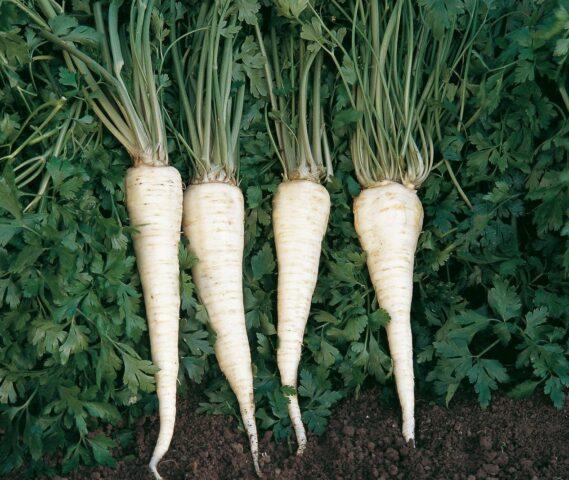
Berlinia is resistant to gunfire
Alba
Late-ripening variety of root parsley. The harvest ripens in 3-4 months. Alba's root crops are large, up to 25 cm long and weighing 220-300 g. The leaf rosette is small, consisting of 12 shoots. Alba greens are high in ascorbic acid and carotene. The pulp is juicy, white, aromatic, with a pleasant spicy taste. The main advantage of this variety of parsley is that it does not branch.
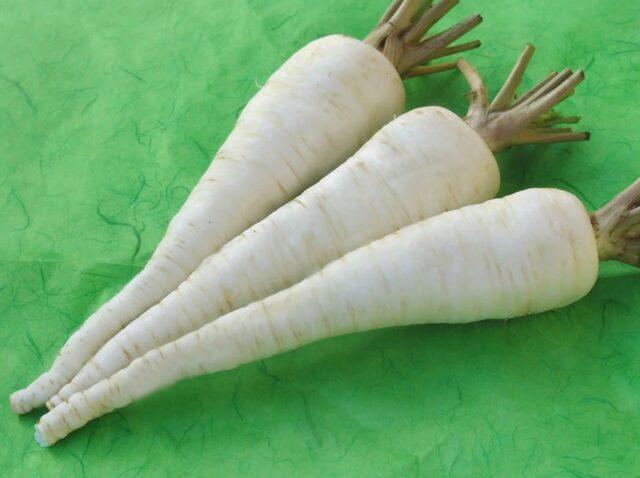
Alba pulp does not darken during processing
The best varieties of parsley for the Moscow region
The temperate continental climate of the Moscow region is excellent for growing leaf and root parsley. Therefore, taking into account the basic requirements of the crop, any beginning gardener can achieve high yields.
Highly productive varieties of parsley with photos for the Moscow region:
- Italian giant (Italianskiy gigant). It is distinguished by large green leaves with a shiny surface. The yield of the variety is 2 kg per season. Forms from 40 to 60 shoots in a rosette.
- Bogatyr. A leafy variety that is ideal for producing aromatic greens. The growing season is 60-65 days. Suitable for growing in greenhouses and open ground.
- Hamburg. Hybrid variety of root parsley. Suitable for long-term storage. Forms cone-shaped fruits, distinguished by juicy white pulp with a pleasant taste and aroma.
Early varieties of parsley
When choosing a crop variety, you need to take into account the climatic conditions of each region. For cultivation in the central and northern regions, it is recommended to choose early species. In this case, the harvest will ripen long before the onset of cold weather.
The best early varieties of parsley for open and closed ground:
- Curly (Petroselinum crispum). The growing season is 50-70 days. The variety is distinguished by beautiful curly leaves, which increases the decorativeness of the bushes. Has a moderate spicy aroma.
- Beads. An early ripening leaf variety with a raised rosette, the height of which is 35-40 cm. The growing season is 55-60 days. The leaves are medium-sized, green, with a delicate aroma.
- A ditty. It is characterized by lush spreading bushes, the height of which reaches 40 cm.The first harvest can be harvested 57-60 days after the appearance of the first shoots. The rosette consists of 40 shoots.
- Konika. The growing season is 122-130 days. Root vegetables have the shape of a triangle. They grow up to 25 cm and reach a weight of 95 g. Productivity per 1 sq. m. – 2.3 kg.
- Good morning. The harvest ripens in 125-130 days. The root vegetables are long, gray-white in color, weighing 60-100 g. The aroma is moderate, the taste is pleasant.
Conclusion
Many varieties of parsley, despite being drought-resistant, require regular watering. This makes it possible to speed up the process of greenery regrowth after cutting. In the case of root species, it is also important to regularly loosen the soil between plantings so that the root has the correct shape and does not branch.
